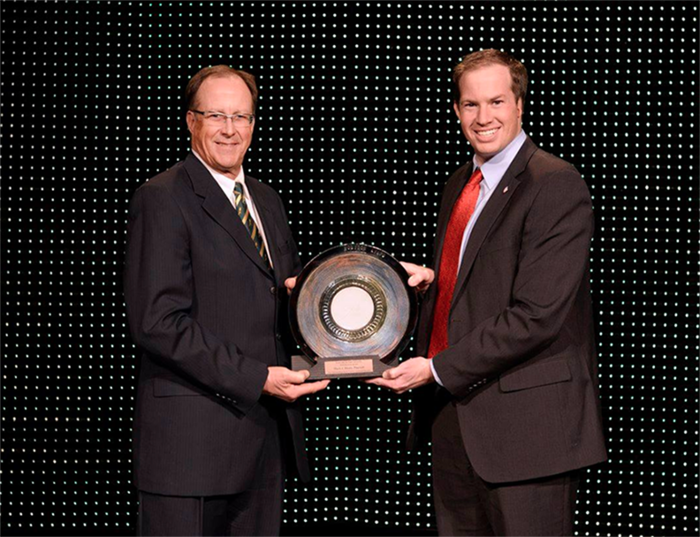
In a community cut in half by floodwaters, Mark Hardy viewed an eye-opening experience that left a lasting imprint.
Hardy recalls how pharmacists in Minot, North Dakota set aside their personal losses and flooding in their own homes in 2011 to make sure their patients received the medication and services they needed throughout the crisis.
“You see many examples of that across the state of North Dakota whenever some tragedy hits a community—that those pharmacists step up to take care of those patients,” said Hardy.
He spoke to students in NDSU’s School of Pharmacy at an Open Forum on April 28. Hardy received his bachelor’s degree in pharmaceutical science from NDSU in 2005 and a doctor of pharmacy degree in 2007.
“In this state, the people value the profession of pharmacy,” said Hardy. “They look to pharmacists to provide that service to the public. You can see when there’s a problem, pharmacists are one of the first to step up to see if they can take care of that problem. That’s a great thing about the strength of our profession in North Dakota.”
After he graduated from NDSU, Hardy spent several years as a pharmacist in Cavalier, North Dakota and Wadena, Minnesota. He received opportunities working for Thrifty White Pharmacy, transitioning stores throughout the region.
Growing up in Neche, North Dakota, population 375, located a mile from the Canadian border, Hardy credits his success to the support of family and values he learned growing up in a rural community.
At the Open Forum, Hardy provided students in the School of Pharmacy the perspective of a relatively recent NDSU graduate.
He now serves as Executive Director of the North Dakota Board of Pharmacy. His office supervises the licensing of pharmacists, pharmacies, pharmacy technicians, prescription drug wholesalers and manufacturers. The Board establishes policies and regulations for the practice of pharmacy and works with the seven-member Board of Pharmacy appointed by the governor. In addition, Hardy is responsible for the state’s Prescription Drug Monitoring Program.
“One of the things that we talk about with students,” said Hardy, “is that if you’re not there helping in the decision or at the meetings that may impact you, then you may be left behind.”
He also encouraged students to seek leadership opportunities.
“We want to be involved in the process,” said Hardy. “We’re always looking at the best interest of the patient. We’re always looking at how we can put pharmacists in the right place to advance the profession with the ultimate benefit to the patient,” he said.
Hardy received the 2016 Horizon Award for NDSU Alumni, recognizing his early career accomplishments and service to community at a ceremony on April 28.
He chairs the National Association of Boards of Pharmacy Prescription Monitoring Program Interconnect committee. Hardy also serves as a member of the pharmacy national advisory board in NDSU’s School of Pharmacy and on the college’s Academic Affairs and Accreditation Subcommittee. In 2007, he received the Mylan Excellence in Pharmacy Award for his graduating class and the Pharmacist Mutual Insurance Distinguished Young Pharmacist for 2009. He also teaches a pharmacy class each semester at NDSU.
“Dr. Hardy is an excellent role model for our young alumni regarding early career success and his passion and involvement with his alma mater,” said Charles D. Peterson, dean and professor in the College of Health Professions.
When speaking with students, Hardy said that in a changing health care industry, pharmacists are called upon to provide a higher level of services to the public.
He noted what he calls the ABC’s of pharmacy—the association, the board and the college—all working together for the good of the patient. He advised students to listen to people’s concerns and issues, empower individuals and develop relationships with people.
“Ethics is everything,” said Hardy. “Keep the ethical boundaries where they are supposed to be. Make good decisions and be able to defend them.”


